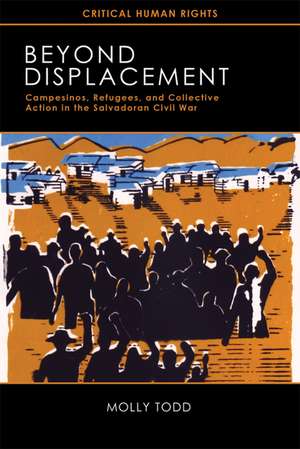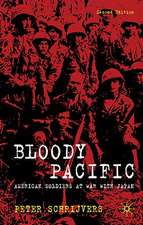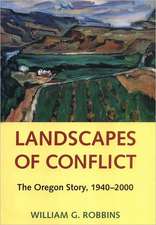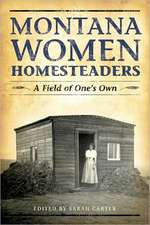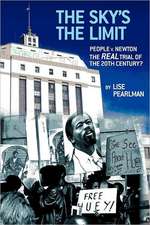Beyond Displacement: Campesinos, Refugees, and Collective Action in the Salvadoran Civil War: Critical Human Rights
Autor Molly Todden Limba Engleză Paperback – 21 dec 2010
During the civil war that wracked El Salvador from the mid-1970s to the early 1990s, the Salvadoran military tried to stamp out dissidence and insurgency through an aggressive campaign of crop-burning, kidnapping, rape, killing, torture, and gruesome bodily mutilations. Even as human rights violations drew world attention, repression and war displaced more than a quarter of El Salvador’s population, both inside the country and beyond its borders. Beyond Displacement examines how the peasant campesinos of war-torn northern El Salvador responded to violence by taking to the hills. Molly Todd demonstrates that their flight was not hasty and chaotic, but was a deliberate strategy that grew out of a longer history of collective organization, mobilization, and self-defense.
Din seria Critical Human Rights
-
 Preț: 167.81 lei
Preț: 167.81 lei -
 Preț: 257.44 lei
Preț: 257.44 lei -
 Preț: 234.39 lei
Preț: 234.39 lei -
 Preț: 159.02 lei
Preț: 159.02 lei -
 Preț: 201.83 lei
Preț: 201.83 lei -
 Preț: 233.54 lei
Preț: 233.54 lei -
 Preț: 189.98 lei
Preț: 189.98 lei -
 Preț: 311.92 lei
Preț: 311.92 lei -
 Preț: 254.11 lei
Preț: 254.11 lei -
 Preț: 225.80 lei
Preț: 225.80 lei -
 Preț: 258.01 lei
Preț: 258.01 lei - 23%
 Preț: 473.27 lei
Preț: 473.27 lei -
 Preț: 179.28 lei
Preț: 179.28 lei -
 Preț: 176.61 lei
Preț: 176.61 lei -
 Preț: 177.37 lei
Preț: 177.37 lei -
 Preț: 235.78 lei
Preț: 235.78 lei - 23%
 Preț: 452.84 lei
Preț: 452.84 lei -
 Preț: 221.81 lei
Preț: 221.81 lei -
 Preț: 213.29 lei
Preț: 213.29 lei -
 Preț: 237.55 lei
Preț: 237.55 lei -
 Preț: 231.15 lei
Preț: 231.15 lei - 23%
 Preț: 472.22 lei
Preț: 472.22 lei -
 Preț: 180.25 lei
Preț: 180.25 lei -
 Preț: 510.83 lei
Preț: 510.83 lei - 23%
 Preț: 474.60 lei
Preț: 474.60 lei - 23%
 Preț: 473.72 lei
Preț: 473.72 lei - 23%
 Preț: 590.00 lei
Preț: 590.00 lei - 23%
 Preț: 477.70 lei
Preț: 477.70 lei - 23%
 Preț: 472.37 lei
Preț: 472.37 lei - 11%
 Preț: 230.06 lei
Preț: 230.06 lei - 13%
 Preț: 200.36 lei
Preț: 200.36 lei - 19%
 Preț: 437.91 lei
Preț: 437.91 lei
Preț: 171.14 lei
Nou
Puncte Express: 257
Preț estimativ în valută:
32.75€ • 34.15$ • 27.22£
32.75€ • 34.15$ • 27.22£
Carte disponibilă
Livrare economică 28 februarie-14 martie
Preluare comenzi: 021 569.72.76
Specificații
ISBN-13: 9780299250041
ISBN-10: 0299250040
Pagini: 306
Ilustrații: 22 b-w illus., 7 charts, 3 maps
Dimensiuni: 152 x 229 x 20 mm
Greutate: 0.43 kg
Ediția:1
Editura: University of Wisconsin Press
Colecția University of Wisconsin Press
Seria Critical Human Rights
ISBN-10: 0299250040
Pagini: 306
Ilustrații: 22 b-w illus., 7 charts, 3 maps
Dimensiuni: 152 x 229 x 20 mm
Greutate: 0.43 kg
Ediția:1
Editura: University of Wisconsin Press
Colecția University of Wisconsin Press
Seria Critical Human Rights
Recenzii
“An utterly original story, well told and absorbing. Todd shows that Salvadoran peasant communities had developed a strategy of mobility and hiding even before the point of international displacement, adapted it to conditions of international refugee camps and transnational solidarity politics in Honduras, and used the camps as a base to push a repopulation movement in tandem with a peacemaking strategy. A new history of the war for El Salvador begins here.”—Steve J. Stern, series editor
“Draws from the best of historical and anthropological methods to document the ways in which courageous individuals and heroic families forged deeper ties of solidarity and built humane communities. Written with great passion and analytic precision, this book contributes to our understanding of an often overlooked facet of El Salvador’s civil war and fitful democratic resurgence.”—Greg Grandin, author of The Last Colonial Massacre
“Reading Molly Todd’s thorough and engaging book brought me back to Los Amates. . . . Todd provides rich detail and some surprising revelations distilled from a diversity of sources, including government, human rights, and the U.N. archives, as well as private collections. She effectively incorporates media and literature reseach and draws on powerful oral history interviews. She enhances interpretations with songs and poetry as well as art and posters produced by Salvadorans in exile.”—Ellen Moodie, The Americas
“Beyond Displacement . . . is an ethnographic account of the turbulent El Salvador–Honduras border region in the latter part of the twentieth century so authentic and engaging that it should become a classic in the field of refugee studies.”—Mark Bonta, Journal of Historical Geography
Notă biografică
Molly Todd is assistant professor of history at Augustana College.
Cuprins
Introduction: A People Without History
Chapter 1. Remapping La Tierra Olvidada
I. Introduction. Lost Peoples, Forgotten Lands
II. The Map Reconfigured: The North as a Space of Opportunity
III. El Salvador's North and La Lucha
Foundations
Formalization and Expansion
Radicalization
IV. Conclusion. Flames of Revolution
Chapter 2. Organizing Flight: The Guinda System
I. Introduction. Unspeakable Acts
II. Civil War, State-Sponsored Violence, and Gente Consciente
III. Mobile Communities and Self-Defense: Origins of the Guinda System
IV. Formalization of the Guinda System
V. Refuge Points and Alliances
VI. Conclusion. From Reaction to Resistance: Combative Mass Movement
Chapter 3. Internationalizing La Guinda
I. Introduction. A Thin Black Line?
II. Discovering Honduras
III. Integrating Honduras into the Guinda System
IV. Organizing Exile
Defining the Community
Managing the Basics
Managing the Moral Boundaries of Community
V. Conclusion
Chapter 4. The Politics of Exile
I. Introduction
II. Allying with Los Internacionales
III. The Politcs of Refugee Aid
IV. Maneuvering the System
Utilizing Fissures
Staging for Success
V. Conclusion
Chapter 5. Citizen Refugees and La Lucha
I. Introduction. Documenting the Present
II. The Patria Stained Red
III. Salvadorans to the Soul
IV. Contributions from Exile
V. Conclusion
Chapter 6. (Re)Writing National History from Exile
I. Introduction. Declining Aid in the Name of te Nation
II. To Educate is to Transform
III.The Political Implications of Popular Education
IV. Documenting Tradition
Refugees as the Heirs of Farabundo Marti and the Martyrs of 1932
The 1969 (B)Order Wars
Tracing Patterns Beyond the Nation
V. Conclusion
Chapter 7. The Grassroots Repopulation Movement
I. Introduction. Going Home
II. Repopulation as Resistance
III. Preparing the Conditions
Phase One: Operation Underground
Phase Two: Going Public
IV. From Negotiation to Direct Action
V. Conclusion. Contested Sove
Conclusion. Body Politics
Chapter 1. Remapping La Tierra Olvidada
I. Introduction. Lost Peoples, Forgotten Lands
II. The Map Reconfigured: The North as a Space of Opportunity
III. El Salvador's North and La Lucha
Foundations
Formalization and Expansion
Radicalization
IV. Conclusion. Flames of Revolution
Chapter 2. Organizing Flight: The Guinda System
I. Introduction. Unspeakable Acts
II. Civil War, State-Sponsored Violence, and Gente Consciente
III. Mobile Communities and Self-Defense: Origins of the Guinda System
IV. Formalization of the Guinda System
V. Refuge Points and Alliances
VI. Conclusion. From Reaction to Resistance: Combative Mass Movement
Chapter 3. Internationalizing La Guinda
I. Introduction. A Thin Black Line?
II. Discovering Honduras
III. Integrating Honduras into the Guinda System
IV. Organizing Exile
Defining the Community
Managing the Basics
Managing the Moral Boundaries of Community
V. Conclusion
Chapter 4. The Politics of Exile
I. Introduction
II. Allying with Los Internacionales
III. The Politcs of Refugee Aid
IV. Maneuvering the System
Utilizing Fissures
Staging for Success
V. Conclusion
Chapter 5. Citizen Refugees and La Lucha
I. Introduction. Documenting the Present
II. The Patria Stained Red
III. Salvadorans to the Soul
IV. Contributions from Exile
V. Conclusion
Chapter 6. (Re)Writing National History from Exile
I. Introduction. Declining Aid in the Name of te Nation
II. To Educate is to Transform
III.The Political Implications of Popular Education
IV. Documenting Tradition
Refugees as the Heirs of Farabundo Marti and the Martyrs of 1932
The 1969 (B)Order Wars
Tracing Patterns Beyond the Nation
V. Conclusion
Chapter 7. The Grassroots Repopulation Movement
I. Introduction. Going Home
II. Repopulation as Resistance
III. Preparing the Conditions
Phase One: Operation Underground
Phase Two: Going Public
IV. From Negotiation to Direct Action
V. Conclusion. Contested Sove
Conclusion. Body Politics
Descriere
During the civil war that wracked El Salvador from the mid-1970s to the early 1990s, the Salvadoran military tried to stamp out dissidence and insurgency through an aggressive campaign of crop-burning, kidnapping, rape, killing, torture, and gruesome bodily mutilations. Even as human rights violations drew world attention, repression and war displaced more than a quarter of El Salvador’s population, both inside the country and beyond its borders. Beyond Displacement examines how the peasant campesinos of war-torn northern El Salvador responded to violence by taking to the hills. Molly Todd demonstrates that their flight was not hasty and chaotic, but was a deliberate strategy that grew out of a longer history of collective organization, mobilization, and self-defense.
